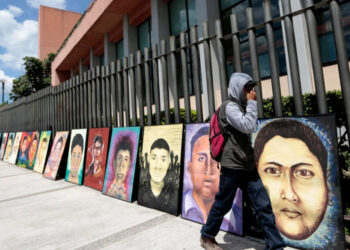Andres Manuel Lopez Obrador, better known as AMLO, overwhelmingly won the Mexican presidential elections on July 1. The electoral result was striking not only because of the high margin of victory but also because of the historically high turnout, something hard to achieve in a country where the population’s disenchantment with politicians is pervasive. With violence soaring, a stagnant economy, and inequality and poverty increasing to indecent levels, AMLO successfully appealed to voters from all segments of the population.
Largely, his victory is due to an effective campaign that identified corruption as a key political issue to be solved. AMLO referred to corruption as the “the root of all evils,” and constantly reiterated his commitment to ending graft and corruption, even when it involved family members. This message clearly resonated with voters tired of waking up almost every day to a new scandal involving some high-level politician embezzling funds in amounts that can only be described as gargantuan.
Despite AMLO’s clear anti-corruption discourse, his recent actions suggest a continued reliance on an existing faulty bureaucracy that has operated with the same inadequate principles. For example, AMLO has stated he will appoint Dr. Irma Sandoval, an academic whose focus is the study of corruption, as a comptroller (head of the Secretariat of the Civil Service or SFP, the body responsible for coordinating, assessing and monitoring the federal government’s public exercise).
Placing one of AMLO’s top anti-corruption advisers in this particular department is worrisome: the SFP has been mostly useless, and sometimes even complicit, when it comes to handling presidential corruption. In 2015, the SFP investigated the current President Enrique Pena Nieto and his wife after a scandal broke out regarding a multimillion-dollar house given to the first lady by Grupo Higa, a constructing company that was also bidding for the construction of a high-speed train. The SFP stated that there was no conflict of interest between the First Lady and Grupo Higa. Of course, what is worrisome is not the nomination itself, but rather the reliance on an institution that is proven to be amenable to manipulation and that cannot credibly claim to hold the president, or those close to him, accountable.
In addition, AMLO seems to be betting on the same botched punitive approach that routinely fails to hold politicians accountable. Despite the multiplicity of agencies that investigate, audit, and compile information on possible malfeasance, this information is rarely actionable. In some cases, public servants found to be corrupt will be punished administratively, meaning that they are fined or suspended from governmental work for a few months or years. In these cases, enforcement is minimal at best: in 2016, only 0.1 percent of the fines imposed by the comptroller’s office (SFP) had been collected.
Egregious cases enter the criminal justice system, a dysfunctional office that was ambitiously reformed in 2008 to tackle the constant violations of human rights and rampant impunity. AMLO has yet to clearly delineate how his administration plans to deal with the criminal justice system, or even acknowledge concern for the current investigative ineptitude of the Public Ministry or the Agency of Criminal Investigation. Both of these organs handle criminal investigations, an area that the reform left untouched. In short, AMLO’s silence suggests that he will continue to rely on the unenforceable administrative punishments and on the already strained criminal justice system, a path that does not inspire hope when it comes to handling corruption.
Finally, and crucially, AMLO’s discourse against corruption would be much more concrete if he clarified what or who exactly embody this corruption that his administration will be fighting against. To put it bluntly, corruption accusations are so prevalent in Mexico that investigating all of them would be an almost impossible task.
Furthermore, it is not the same to fight the corruption that arises when a traffic cop pulls over a car and requests a bribe versus high-level politicians who graft money in public biddings; or that which diverts millions originally destined for public works.
Translating the vague discourse of “ending corruption” into workable policies necessitates a clear statement of the cases that will be considered priority, a crucial issue if we consider the selectivity with which corruption is currently prosecuted. This issue is even more pressing given that just a week after the election, AMLO refused the suggestion made by some members of the civil society of first allowing a reform (already on the works) granting independence to the office of the Attorney General before filling out that position. For some, this refusal means that the administration of justice will still be functionally dependent on the president, hindering the construction of a fair legal system capable of overseeing those in power.
For all the change that was promised in AMLO’s discourse, his actions regarding corruption seem to suggest more of a continuity than a break with existing practices. A generous reading of this continuity would suggest that AMLO is acting under the assumption that the flaws of the current political system lie not in the institutions that structure the exercise of public office, but rather in the people that operate within them. But a democracy is much better off trusting the former instead of the latter.
It is not enough to bring honest public servants into the administration: a government with such a clear popular mandate has the unique opportunity (and some would say duty) to ensure that when corruption is encountered, formal processes exist to repair the damage done, hold public servants accountable, and restore citizen’s trust in their justice system.
Disclaimer: The views and opinions expressed here are those of the author and do not necessarily reflect the editorial position of The Globe Post.




















